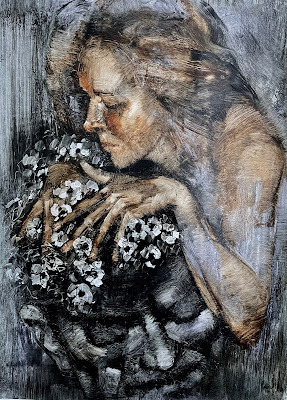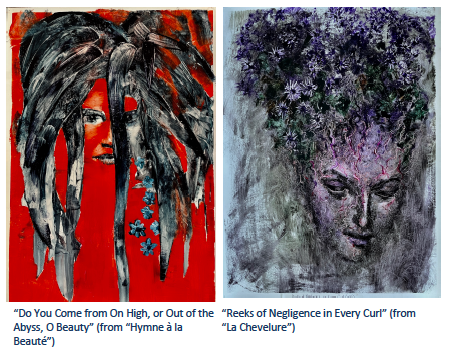So already, the poem I've been writing for the last two months isn't finished yet. But the process of writing it has been so affirming and engaging that I wanted to write about it.*
It's been taking a willing, insightful village* to move the writing of this poem forward--and what could be more affirming than the thoughtful willingness of one's fellow villagers? How fortunate I am to have a writing group and poetry-reading friends from my college days who've read and commented on "November Dark" during these last weeks. Their sensibilities as readers and firsthand knowledge of me have helped the poem hone in on both my personal emotional truths and on some related more universal ones. I am so grateful to these reader-friends.
Still, this post is going to focus on my dark-day-in, dark-day-out relationship to the poem.
"November Dark" is a long--really, a long ass**--poem. Returning to it again and again during this season of late sunrises and early sunsets has been both comforting and challenging. And "November Dark" has insisted that I return to it again and again.
So why "long ass"? I know I'm not someone you'd generally expect to use that word, especially in writing. It's not just that the poem I'm writing is long--not as long as Paradise Lost, or even "Ash Wednesday," but long for me. And it's not just that it's taking me a long time to write it--not as long as it probably would have taken Elizabeth Bishop to craft what she would have considered a respectable first pass at a poem, but a long time for me.
More importantly, "November Dark" has had me stuck in its craw*** since early November--so "long ass" has more to do with the quality of the experience of writing a first respectable draft of it over a number of weeks.
Frankly, the poem has been completely inhabiting me--teasing me some days, daring me others, eluding and encouraging me in alternation, playing hide and seek with me--often acting more like a skittish potential lover** than a bunch of words on a page actually trying to become and say something.
In other words, it's been plaguing me in the best possible way. It's been my companion, a soulmate**** who keeps me up at night with constant suggestions and considerations, with ideas for other words and alternative phrases. It's been fostering the kind of sleeplessness that inspires rather than troubles me--which is ironic because the poem is rooted in the experience of troubling routine sleeplessness. Once I finish this poem, I think I'll miss its knocking on the door of my consciousness at any hour, and my immediate flinging open of that door to welcome it. Realizing this makes me a little ambivalent about finishing it.
So why has writing this poem been a particularly engrossing, extended experience? Why have I felt so attached to it? No doubt because its subject is loss and grief that are fresh, alive, and mine right now. As many of you know, my mother died in early October, my father died at this time of year four years ago, and Kamala
Harris lost to Donald Trump in early November's presidential election.
On December 5, when I was struggling to know how to combine certain ideas and blocks of content that I instinctively felt belonged together in the poem's third section, I wrote the following about the effect grief was having on my relationship with the world:
There's a sense that there's a veil or scrim interposed between me and the urgent, my blunted sense of the urgent, despite my recognition of it. And I was glad of that blunted sense. That's one of the interesting things about grief, I think: it both holds you and sustains you, even though it weighs on you and causes you pain. But really what it causes you is sadness because it's real and you know that you're wounded--and you're wounded in a healthy, understandable way. It's almost like it makes nothing else matter all that much. And you just try to go about your day as best you can without magnifying anything or dismissing anything. You don't make more of it and its effects; you don't make less of it and its effects.
As soon as I wrote this, I realized that though my long ass poem explicitly says I am mourning for my mother, it does not say that I am mourning for my father:
Yes, I'm mourning for . . . [my father and mother] both because I finally don't have to worry about her, but also because I always felt that my father was somehow alive in me because I was taking care of my mother, and that would have meant so much to him. So I carried him with me in this very active and . . . [embodied] way every time I went to see her. I still carry him with me, but not in the same way.
The truth of the matter is that I now realize--well, it's not just now--that I'm really mourning for both my mother and father--her death took him away from me again, . . . added another layer or level of separation to what was already a major separation. And how could I not be when so many of the pictures that I have of each of them are pictures of both of them?
In the same way I invisibly carried my father with me whenever I went to visit my mother in these last four years, my long ass poem, which makes no mention of him, invisibly carries him, too. Sometimes one poem can't tell the whole story, can't make explicit all the layers. And yet they're there. I think I'm writing this blog post to assert the presence of my father in the bones of my poem.
This year, Hanukkah comes exceedingly late: the first candle will not be lit until the Christmas Day night, and eighth candle will not be lit until New Year's Day night. I'll be lighting both my "Womenorah," as it was called by the Vermont artist who created it years ago, and the menorah that was always at the center of my family's Hanukkah observances throughout my childhood and teenage years. Now that both my mother and father are gone, I feel especially fortunate to have inherited what was their menorah.
On the second night of Hanukkah, I'll be lighting an additional candle--the one that marks my father's yahrzeit--the anniversary of his death on Jewish calendar. So there will be plenty of light in my dining room. And lots of memories.
It's been a long-ass year--I think everyone who's been at all caught up in this year's election fever feels this way, too. And yes, my long ass poem is close to being done. You will get to read it sometime in 2025 if that's your wish.
Until then, may you fully enjoy the various holidays you'll be celebrating as the solstice passes and we head again toward the light. May you and your loved ones enjoy celebrating with one another, and may your memories of those with whom you celebrated in years gone by be more sweet than sad.
* "Cobbled
steps meandering between quaint cottages in the North Yorkshire coastal
village of Robin Hoods Bay. Pen & Ink - 8"x11"on Facebook: https://www.facebook.com/photo.php?fbid=472623692089089&id=100080243860310&set=a.165923569425771
** The online world offers two spellings for this word, "long ass" and "longass." Autocorrect likes "long ass" better.
*** Screen shot of work of art on this website: https://dateagle.art/blog_post/clare-price/--a Clare Price blog post.
****"Like chrysalids unfold their wings and soar into the night"--a painting by Scott Ketcham that will be on view in January and February 2025 in the Horan Gallery at the Ventress Memorial Library in Marshfield, MA. https://ventresslibrary.assabetinteractive.com/calendar/scott-ketcham-reception/


































